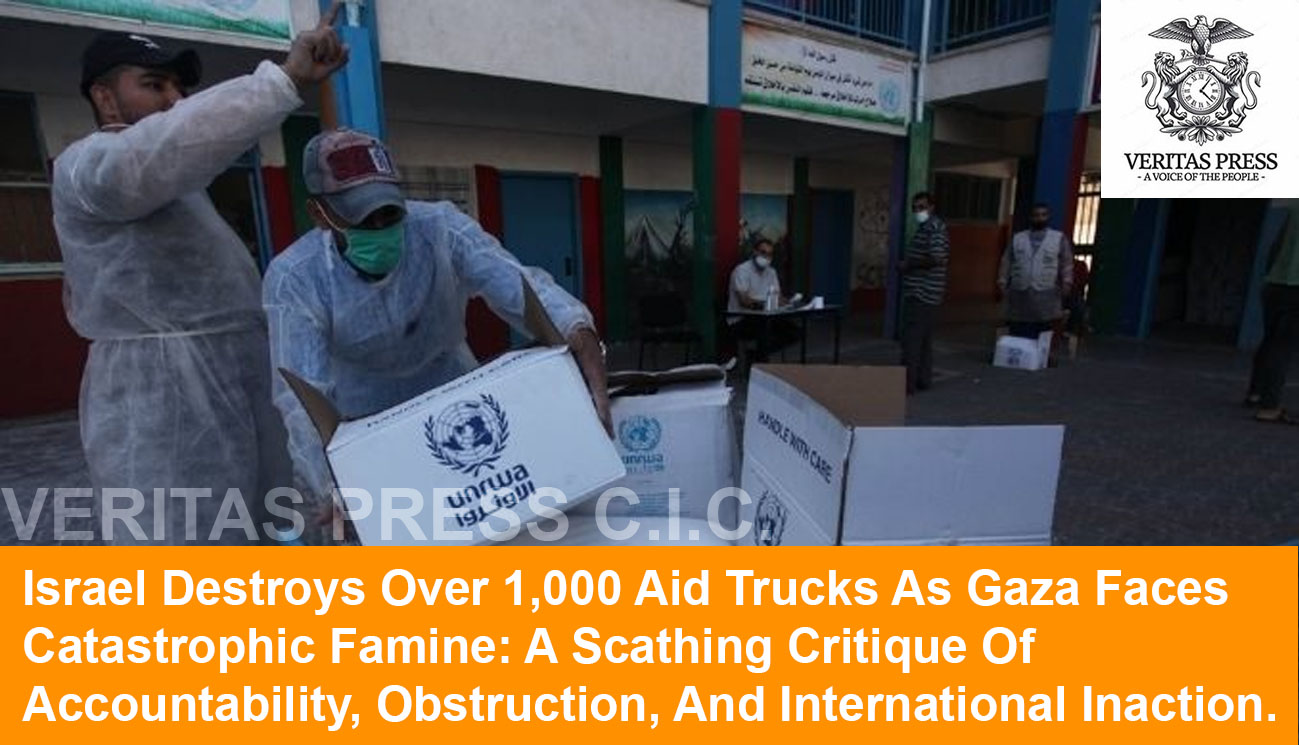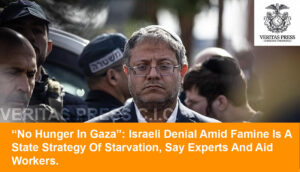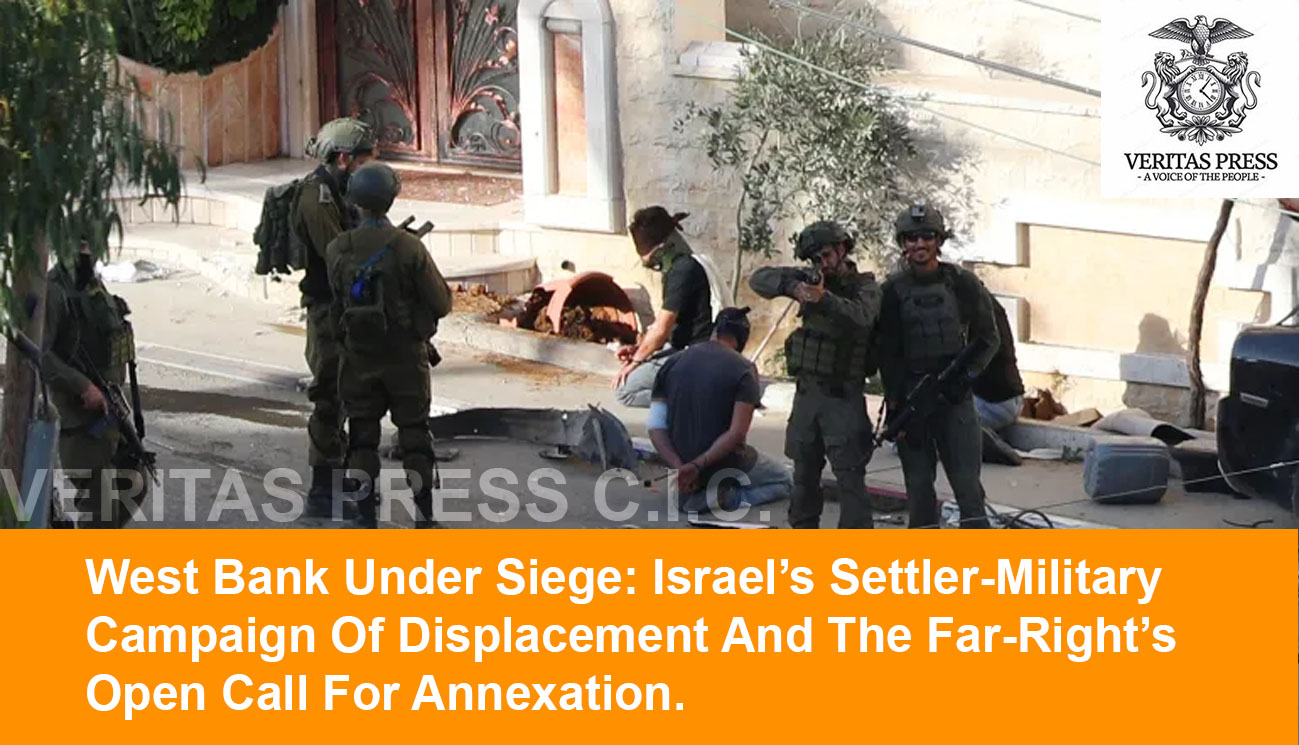The destruction of over 1,000 truckloads of humanitarian aid bound for Gaza, comprising essential food, medicine, and water, marks a harrowing escalation in Israel’s ongoing siege of the Gaza Strip. This deliberate act of blocking life-saving assistance is part of a broader, systematic effort to starve an entire population into submission, under the guise of military necessity and security concerns. The latest reports by the Israeli Broadcasting Corporation (KAN) confirm the destruction of tens of thousands of relief packages, including large quantities of therapeutic food for malnourished children, and are adding weight to accusations that Israel is using hunger as a weapon of war.
Amid the current humanitarian catastrophe, Gaza’s population, more than 2.3 million people, faces an existential crisis. With global condemnation rising, questions loom about the legality and ethics of Israel’s actions, the complicity of international actors, and the adequacy of the global response to a siege that some analysts are calling a modern-day war crime or even genocide.
A Deliberate Act Of Destruction: Eyewitness Accounts And Testimonies:
Eyewitnesses inside Gaza report increasing desperation as humanitarian aid, including critical supplies like infant formula and medical equipment, is left to rot at border crossings. One aid worker at the Rafah border crossing described the scene: “It’s heart-wrenching. We can see the trucks filled with food and medicine. But they’re not allowed to cross. Instead, they are parked under the sun, deteriorating. And we are told, ‘If it’s not distributed, it will be destroyed.’”
Local residents paint a grim picture of survival. “People are eating grass, animal feed, or anything they can find. I’ve seen children eating raw flour from dried corn husks, hoping it might fill their stomachs,” says Iman Abed, a mother and displaced resident from Gaza City. “It’s a daily struggle just to keep my children alive, and now, even the aid is being blocked. It’s cruel.” Countless others echo her testimony in the besieged enclave, where entire families survive without access to essential nutrition or healthcare.
The destruction of aid has also been confirmed by local journalists, including Rami Almeghari, a freelance reporter based in Gaza, who tweeted: “More than 1,000 aid trucks carrying food and medicine were deliberately destroyed at the Rafah crossing over the past 48 hours. These are supplies meant to save lives, and Israel has chosen to destroy them, further deepening the humanitarian crisis.”
Israel’s Justifications: A Pattern Of Blockades, Delays, And Deflection.
In its defence, the Israeli government has claimed that the aid destruction is due to alleged failures in Gaza’s “aid distribution mechanism.” According to military sources, “There are thousands of parcels left under the sun, and if they are not transported to Gaza, we will be forced to destroy them.” The Israeli military further deflects blame onto the political and administrative chaos within Gaza, which has been exacerbated by years of warfare and blockades.
However, this narrative is met with scepticism and outrage from international aid organisations and legal experts. “The claim that aid is being destroyed due to a failure in distribution is an affront to common sense,” says Michael Fakhri, the UN Special Rapporteur on the Right to Food. “The destruction of food and medical supplies is a deliberate act of collective punishment. Israel’s actions violate international humanitarian law and may amount to war crimes, if not genocide.”
International non-governmental organisations (NGOs) have condemned Israel for using starvation as a tool of war. “This is not about aid distribution failures,” says Oxfam’s policy lead, Bushra Khalidi. “It’s about an entire population being systematically deprived of the most basic human rights. Children are starving, people are dying from preventable diseases, and Israel is actively obstructing all means of relief.”
Humanitarian experts argue that the situation in Gaza represents a form of “siege warfare,” a tactic that international law experts have widely criticised. By deliberately preventing aid from reaching its destination, Israel is committing what may be classified as crimes against humanity.
International Legal Experts Weigh In: A Violation Of The Genocide Convention?
As the death toll from malnutrition rises, currently standing at 123, including 83 children, calls for accountability have grown louder. Legal experts and UN officials increasingly argue that Israel’s actions may not only violate the Geneva Conventions but also constitute a breach of the Genocide Convention. The deliberate destruction of humanitarian supplies, paired with restrictions on access to food and medical treatment, points to a clear pattern of systemic denial of basic human rights.
Dr. Richard Falk, an expert in international law and former UN Special Rapporteur on Palestine, argues: “What we are seeing is an ongoing process of dehumanisation and extermination. Denying an entire population the means to survive, including food and medicine, goes far beyond military strategy; it’s an act of ethnic cleansing.”
Falk’s claims are echoed by Amal Clooney, a prominent international human rights lawyer, who stated, “The evidence is overwhelming. This is not just a violation of the laws of war; this is an intentional campaign to starve a civilian population. The world must stop turning a blind eye to what could be the beginnings of genocide.”
Global Protests: A World Responds To The Crisis.
The international response to Israel’s actions has been a mix of condemnation and inaction. In major cities across the globe, protests have intensified. In London, thousands of demonstrators marched through the streets chanting, “Stop the Siege! Lift the Blockade! Gaza Needs Aid!” Similar rallies have been held in Paris, Istanbul, Johannesburg, and New York, with activists demanding that governments take a firmer stance against Israel’s actions.
The UN, too, has found itself at a crossroads. Human rights organisations, including Amnesty International and Human Rights Watch, have accused Israel of “deliberately using starvation as a weapon” and called for international sanctions. Yet, despite overwhelming evidence and widespread condemnation, key global powers, including the United States, which has long provided military aid to Israel, have failed to take decisive action to address the crisis.
In an interview with Al Jazeera, activist and academic Dr. Hanan Ashrawi said, “The world cannot ignore the evidence that this is a deliberate policy of starvation. If this is not genocide, it is certainly an attempt to destroy the very fabric of Palestinian society.”
The Role Of International Media: A Call For Accountability.
Despite the growing urgency of the crisis, some media outlets have been criticised for downplaying or misrepresenting the severity of the situation. Journalists and activists in Gaza have accused global news agencies of focusing too heavily on the military aspect of the conflict, without fully addressing the scale of the humanitarian catastrophe unfolding.
Maya Mirza, a reporter with Al Jazeera’s investigative unit, has been covering the Gaza crisis extensively. She recently commented: “International media coverage of Gaza often paints a one-sided picture, focusing on rocket attacks and airstrikes while overlooking the systematic destruction of aid and the suffering of civilians. The human rights abuses taking place right now need to be front and centre in any global discussion.”
The Human Toll: Who Is Paying The Price?
The human toll is staggering. According to Gaza’s Health Ministry, at least 122 people have died from starvation-related causes, and thousands more are at risk of death due to malnutrition, lack of access to clean water, and untreated medical conditions. Dr. Sami Al-Sayed, a paediatrician working in Gaza, reported a horrifying increase in child malnutrition cases: “Children are coming to the hospital in critical condition. We don’t have the necessary food supplies or medicine to treat them. They are dying in our arms. This is not just a medical emergency; this is a human rights disaster.”
Yet, despite this devastation, Israel continues to block the entry of critical supplies, while the international community remains largely silent or ineffective in halting the blockade.
The Call For Immediate Action:
The destruction of humanitarian aid and the worsening famine in Gaza cannot be ignored any longer. The international community must demand that Israel immediately lift the blockade, open the borders to unrestricted humanitarian aid, and cease the targeted destruction of vital supplies. Additionally, there must be a coordinated effort to hold Israel accountable for its actions under international law, including potential investigations into war crimes.
The people of Gaza are not simply victims of a conflict; they are the victims of an ongoing, deliberate policy of starvation, isolation, and denial of basic human rights. The global response has been inadequate, and as the death toll rises, the question remains: will the world act before it’s too late, or will Gaza continue to pay the ultimate price for its survival?
Conclusion: A Deliberate Crime Against Humanity, The Systematic Starvation And Destruction Of Gaza.
Israel’s destruction of over 1,000 truckloads of humanitarian aid is not only a blatant violation of international law; it is an abhorrent war crime and a systematic strategy designed to deprive Palestinians of food, water, medical aid, and the basic means of survival. This deliberate obstruction of life-saving supplies, in the context of a nearly two-decade-long blockade and ongoing military occupation, is a gross violation of humanitarian law and the Geneva Conventions. Under these international frameworks, targeting civilians and preventing the delivery of essential aid is unequivocally prohibited, as it deprives innocent people of their fundamental right to life and dignity.
By actively destroying tens of thousands of relief packages, including food and medicine crucial for the survival of Gaza’s population, Israel is engaging in an act of collective punishment, a form of warfare that aims to make an entire population suffer, not for any military advantage, but purely for political and strategic purposes. This calculated denial of life-sustaining resources is no mere consequence of war but a designed tactic intended to break the spirit of Gaza’s people. It is a systematic effort to render them invisible, to erase their basic needs and rights, and to force them into a state of subjugation and desperation.
Israel’s defence of its actions, claiming they are a response to “failures” in Gaza’s aid distribution system, only deepens the cynicism of its policies. These justifications fail to account for the fact that Gaza’s infrastructure, including hospitals, water treatment plants, and roads, has been deliberately targeted and destroyed by Israeli airstrikes, leaving civilians with no means of receiving aid even if it were allowed to cross the border. The breakdown in infrastructure is not the cause of the humanitarian crisis; it is the result of Israel’s ongoing military aggression and blockade, which has crippled Gaza’s ability to function.
This is not an isolated incident. It is part of a broader, premeditated design to deprive Palestinians of the very means needed to live: food, water, and medicine. It is an unprecedented crime, carried out with impunity, and its consequences are borne most tragically by Gaza’s children, the elderly, and the most vulnerable. As over 120 people, mostly children, have already died from malnutrition and preventable diseases, the urgency of international intervention has never been clearer.
Israel’s actions must be recognised for what they are: a deliberate violation of humanitarian law. The destruction of aid trucks, the continuous obstruction of food and medical supplies, and the calculated use of starvation as a weapon of war are all part of a strategy aimed at dehumanising and ultimately eradicating an entire population’s ability to survive. The United Nations, human rights organisations, and the international community at large must stop looking away and start holding Israel accountable for these crimes against humanity.
The Airstrikes: A Devastating Assault on Gaza’s People, Livestock, and Agriculture.
In addition to the blockade and destruction of humanitarian aid, Israel’s constant airstrikes have inflicted further devastation on Gaza’s population and its already fragile infrastructure. The airstrikes, often using bombs that include white phosphorus, a substance internationally recognised as illegal in populated areas due to its devastating and indiscriminate impact, have crippled the local population, set entire neighbourhoods ablaze, and destroyed key agricultural zones.
Reports from Gaza’s Ministry of Agriculture confirm that the bombing campaigns have obliterated thousands of acres of farmland, leaving already malnourished families without any means of local food production. Local livestock, which has been a crucial source of nutrition for many families, has also been severely affected. Cattle, poultry, and sheep have been killed, maimed, or left unable to graze due to the destruction of pastures and farmland, further exacerbating the already dire food shortage. One farmer, Abu Ahmad, who had seen his land bombed multiple times, shared his grief with reporters: “My crops were my only hope. I relied on them to feed my family. Now, the fields are burned, and my animals are dead. What will we eat tomorrow?”
The use of white phosphorus in these airstrikes is not accidental; it is a calculated tactic aimed at causing maximum suffering. White phosphorus is a weapon that burns through human flesh and results in severe, long-lasting injuries. It has been deployed in densely populated civilian areas, in breach of international law. Human rights organisations such as Amnesty International and Human Rights Watch have condemned its use, calling it an indiscriminate weapon that causes “horrific burns and injuries to civilians.”
These airstrikes and the use of chemical weapons compound the already catastrophic effects of the blockade, turning Gaza into a man-made wasteland where basic survival is increasingly impossible. The combination of military aggression, starvation, and disease has created an environment where life itself is under constant siege.
Global Inaction: The International Community’s Complicity.
The international community’s failure to act decisively against Israel’s war crimes is as egregious as the crimes themselves. By refusing to apply pressure or impose sanctions, powerful nations, including the United States and the European Union, are complicit in the ongoing atrocities. Their continued support for Israel’s actions, despite clear violations of international law, sends a dangerous message: that the lives of Palestinians are expendable, and their suffering is of no consequence on the global stage.
The time for diplomatic rhetoric and ineffective resolutions has passed. The world can no longer stand by while Israel carries out a systematic campaign to starve, maim, and crush the spirit of Gaza’s people. Immediate action is needed: the blockade must be lifted, the crossings must be opened, and humanitarian aid must flow freely into Gaza, without interference or delay.
Inaction is complicity. The world must act now to prevent further loss of life, to hold Israel accountable for its actions, and to ensure that the people of Gaza are given the opportunity to survive with dignity. This is not just a Palestinian issue; it is a global moral imperative. The destruction of Gaza, through starvation, deprivation, airstrikes, and the use of white phosphorus, is an injustice that will haunt the conscience of the world unless the international community steps up to demand justice, accountability, and an end to the suffering. The people of Gaza are entitled to the basic right to life. Their suffering must be met with action, not indifference. The time for a decisive, global response is now.
Advertisements
Tags:




























Leave a Reply